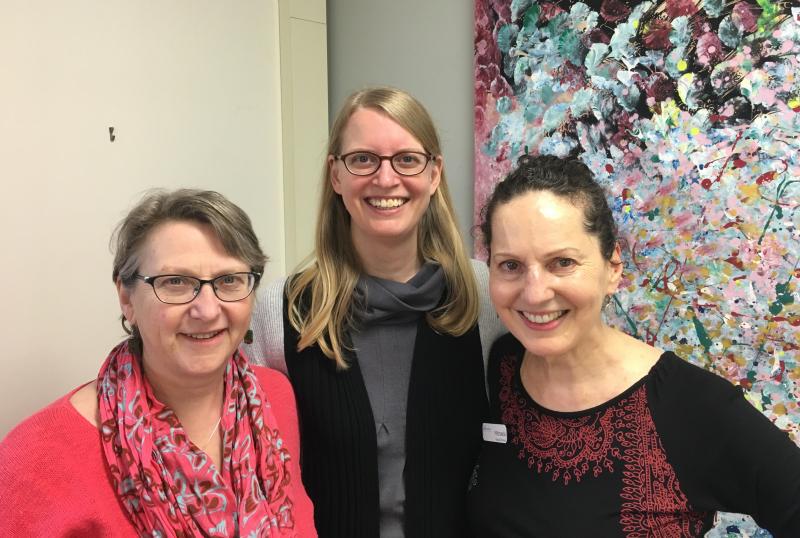When you board an airplane, the pre-flight safety video instructs you to put on your own oxygen mask before helping others.
It’s an important rule of air travel survival, and an apt analogy that PHC geriatric psychiatrist Dr. Elisabeth Drance references when stressing how important it is for caregivers of people with dementia to prioritize their own wellbeing.
“People don’t think they’re really allowed to do that. They think they’re supposed to look after the other person at all costs,” says Dr. Drance.
In much of her 30 years of practice, she has focused her care on the individual with the illness. What she has come to understand is that many family caregivers have their own overwhelming needs. The number of people with dementia is growing rapidly and family members provide 75-80 per cent of their care. As a result, family caregivers may experience chronic stress which is linked to the development of both physical and psychiatric illness.
To provide much-needed support, the PHC Dementia Caregiver Resource Team was established last March with a vision to improve the wellbeing and increase the resilience of dementia caregivers through knowledge, skill-building, and self-care. Comprised of Dr. Drance, in partnership with PHC Occupational Therapist Karen Gilbert and Social Worker Michaela Leicht, the team targets high-risk caregivers experiencing significant distress. In addition to individual therapy, the team provides group therapy through two unique programs.
Problem solving and patient simulation
The Reitman Center for Alzheimer’s Support and Training CARERS (Coaching, Advocacy, Respite, Education, Relationship, and Simulation) program employs problem solving therapy and patient simulation to train family caregivers.
The PHC team ran the evidence-based CARERS program at the St. Paul’s Hospital Elder Care Ambulatory Clinic last fall for spouses of people with dementia. The first half of the 10-week course focuses on problem solving therapy.
“What we find is when people are looking after people with a dementia, the emotional overwhelm of the experience itself really affects their ability to problem solve the myriad of challenges they face,” explains Dr. Drance.
Participants learn how to break down a broad and often emotionally overwhelming issue into smaller parts which have practical solutions. This structured and systematic approach results in finding solutions to caregiving problems that participants can implement right away.
The second half of the course provides the opportunity for group members to learn new skills on an experiential level. Simulation is a guided re-enactment of a real and recent incident in the carer’s life. By working with a simulated patient – played by a specifically trained actor – group members have the opportunity to work through day to day issues that have to do with interactions or relationships. Emotional challenges and gaps in knowledge, skills, and attitudes are identified.
Caregivers or facilitators can call a time-out at any point if support is needed or a caregiver is unsure how to proceed.
“Often a scenario will be played out three or four times, with the caregiver and actor giving feedback about their felt experience each time,” notes OT Karen Gilbert
With guidance and coaching, participants are able to learn new, more effective approaches and practice these skills within the simulation. “It has been encouraging to witness the participants’ integration of these skills over a relatively short period of time,” Gilbert says.
A mindful approach to self-care and communication
The Mindfulness-Based Dementia Care program was developed in California by social worker Marguerite Manteau-Rao and will be offered at the SPH Elder Care Ambulatory Clinic for the first time this spring. The eight-week course teaches a mindfulness-based approach to self-care and wise communication between care partners, in addition to relevant dementia education. Participants will learn mindfulness practices as ways of improving the quality of life for themselves and the person they’re caring for.
“Consistent mindfulness practice has been shown to make structural changes in the brain that allow us to be less reactive and more aware of how we are behaving in any moment,” says Dr. Drance, who is currently in the middle of a two-year mindfulness teacher training program . “Developing those kinds of skills really helps people make wise choices when they’re caring for their family member.”
‘This is just the beginning’
Social Worker Michaela Leicht is excited to be able to offer new tools to people who are challenged in their caregiver roles.
“What we don’t want is caregivers to burn out, break down, and then end up with their own health problems,” she says. She hopes to see these programs expand to meet a growing demand.
“There is certainly tremendous need out there. A lot of caregivers feel quite helpless in the face of dealing with dementia,” she says.
The team is grateful to PHC Elder Care for making it possible to establish the Dementia Caregiver Resource Team. Going forward, the hope is to offer therapy programs for family caregivers at more PHC sites and develop research ties with the Reitman Center and UBC.
“This is just the beginning, but it’s been really exciting to see how it’s growing and the enthusiasm,” says Dr. Drance. “These programs are providing practical skills for people to learn how to put on their own oxygen mask first.”





